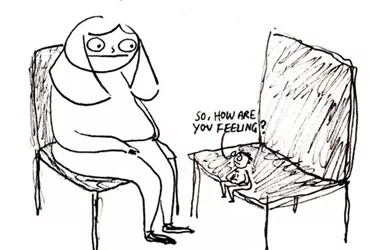Plan B on Psychotherapy Regulation
Zarathustra warns that plans to regulate psychotherapy are being watered down by the Coalition Government.
Despite the complex work they do with very vulnerable people, counsellors and psychotherapists are surprisingly under-regulated. Anyone can call themselves a psychotherapist, and there is no obligation to belong to a professional association. This can increase the risk of abuse and make it harder to make a complaint. Government plans to regulate the industry are sadly being watered down by the Coalition.
The lack of regulation was illustrated by the case of Derek Gale, an arts therapist struck off by the Health Professions Council (HPC) for physically, sexually and financially abusing his clients. The HPC regulates arts therapists, as well as occupational therapists, radiographers and other healthcare professions. Psychotherapists, however, are regulated by nobody, so Gale could continue practising by himself retitling himself as a psychotherapist.
The previous government planned to make "counsellor" and "psychotherapist" protected titles, to be regulated by the HPC, which has a robust complaints system to deal with fitness-to-practice issues. Sadly, the new coalition has opted for a weaker plan B approach.
Under plan B, statutory regulation will be replaced by "assured voluntary regulation". The HPC will be allowed to set up a voluntary register which counsellors and psychotherapists can join. In addition, existing psychotherapy organisations can apply to have their complaints procedures accredited by the Council for Healthcare Regulatory Excellence (CHRE), to be renamed the Professional Standards Authority for Health and Social Care.

Some of these organisations would find it easier than others to gain accreditation from the Professional Standards Authority. The British Association for Counselling and Psychotherapy, for example, has an excellent code of ethics and complaints procedure, and would probably have little difficulty being accredited. At the other end of the scale, some therapy organisations do not have lay members for complaint hearings, so the therapist is judged by his or her own colleagues. Some require complaints to be proven to the criminal standard of "beyond reasonable doubt." The College of Psychoanalysts UK even expects people to pay costs if their complaint is rejected! (Click on the link and see Part 5 1.2.1) Such organisations may well need to reform if they want to be accredited.
Effectively, the government is creating a "marketplace of regulators" with the HPC and accredited organisations in competition with each other. There is no obligation for a therapist to join one of these regulators, though quite likely they'd be unlikely to get any work from the NHS, social services or schools and colleges without doing so. However, critics have pointed out that "counsellor" and "psychotherapist" will still not be protected titles, and this will still leave the professions with no nationally-agreed set of standards or ethics.
The new proposals are at least an improvement on the current situation. Even so, they do not go far enough to protect the vulnerable from abusive psychotherapists. People who use these services need proper statutory regulation.

Our campaigns
We'll fight your corner. We believe everyone with a mental health problem should be able to access excellent care and services. We also believe you should be treated fairly, positively and with respect.
Share your story with others
Blogs and stories can show that people with mental health problems are cared about, understood and listened to. We can use it to challenge the status quo and change attitudes.

















